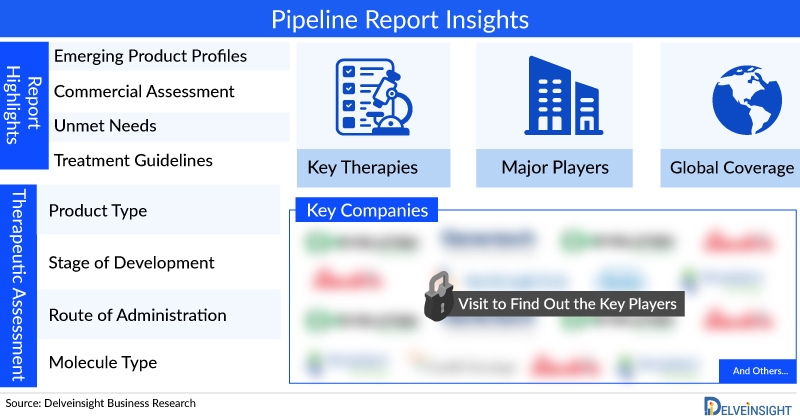DelveInsight’s “Castleman Disease – Pipeline Insight, 2025” reviews a growing portfolio of novel approaches that move beyond conventional immunosuppression. Monoclonal antibodies targeting IL-6 and its receptor, along with second-generation cytokine blockers, are being optimized to improve response rates and long-term disease control. Emerging therapies include JAK/STAT pathway inhibitors, next-generation B-cell–directed therapies, and immune checkpoint modulators, designed to address the inflammatory and immune dysregulation underpinning MCD. Precision-based strategies such as biomarker-guided treatment selection and genomic profiling are shaping clinical trial designs, ensuring more tailored therapeutic interventions.
The 2025 pipeline reflects a paradigm shift in Castleman disease management—from symptom suppression toward disease modification. Backed by regulatory incentives for rare diseases and rising collaboration between academia, biotech innovators, and global foundations, the field is poised to deliver more durable, patient-centric therapies. With biologics, small molecules, and immune modulators progressing through clinical stages, the Castleman disease landscape is evolving toward broader treatment access and long-term remission potential.
Interested in learning more about the current treatment landscape and the key drivers shaping the Castleman Disease pipeline? Click here
Key Takeaways from the Castleman Disease Pipeline Report
• DelveInsight’s Castleman Disease pipeline analysis depicts a strong space with 3+ active players working to develop 3+ pipeline drugs for Castleman Disease treatment.
• The leading Castleman Disease companies include Senhwa Biosciences, and others are evaluating their lead assets to improve the Castleman Disease treatment landscape.
• Key Castleman Disease pipeline therapies in various stages of development include Fulvestrant, Bicalutamide, and others.
• The only FDA-approved therapy for idiopathic multicentric Castleman disease (iMCD) remains Sylvant (siltuximab). It was initially approved on April 23, 2014, for HIV-negative, HHV-8-negative MCD
• A clinical trial evaluating ruxolitinib (a JAK inhibitor) in adults with previously treated iMCD is currently underway. The study was listed with a start date of July 25, 2025.
• A remarkable case report published February 5, 2025, described a patient with relapsing iMCD who achieved 24-month remission after treatment with adalimumab, a TNF-blocking agent. This finding, which highlights a novel therapeutic approach, was noted in a letter to the editor in the New England Journal of Medicine
• No new FDA approvals or regulatory actions specific to Castleman disease have occurred recently through mid-2025.
Castleman Disease Overview
Castleman Disease (CD) is a rare disorder characterized by abnormal growth of lymph node tissue, leading to lymphoproliferation. It primarily presents in two forms: Unicentric Castleman Disease (UCD), which affects a single lymph node region and is usually localized and asymptomatic or causes symptoms due to compression of nearby structures; and Multicentric Castleman Disease (MCD), which involves multiple lymph node regions and is associated with systemic symptoms like fever, fatigue, weight loss, and enlarged organs. MCD can be caused by human herpesvirus-8 (HHV-8), especially in immunocompromised patients, or occur as idiopathic MCD without a known viral cause.
The underlying mechanism in MCD often involves excessive production of inflammatory cytokines, particularly interleukin-6 (IL-6), driving widespread inflammation and lymph node proliferation. Treatment depends on the disease subtype and severity, ranging from surgical removal for UCD to targeted therapies such as anti-IL-6 antibodies (e.g., siltuximab), immunosuppressants, antivirals, or chemotherapy for MCD. Early diagnosis and appropriate management are essential to control symptoms and improve outcomes.
Find out more about Castleman Disease medication at https://www.delveinsight.com/report-store/castleman-disease-pipeline-insight
Castleman Disease Treatment Analysis: Drug Profile
Silmitasertib: Senhwa Biosciences
Silmitasertib (CX-4945), developed by Senhwa Biosciences, has been shown in clinical studies to effectively target CK2 and modulate the intended pathways without causing toxicity. As a single-agent CK2 inhibitor, CX-4945 has demonstrated clinical benefits, including stable disease and prolonged treatment duration in several patients. Additionally, combining CX-4945 with DNA-damaging chemotherapy agents like gemcitabine (Gemzar) and cisplatin (Platinol) has exhibited synergistic effects, enhancing the overall efficacy of these anticancer therapies.
Learn more about the novel and emerging Castleman Disease pipeline therapies.
Castleman Disease Therapeutics Assessment
By Product Type
• Mono
• Combination
• Mono/Combination.
By Stage
• Late-stage products (Phase III)
• Mid-stage products (Phase II)
• Early-stage product (Phase I) along with the details of
• Pre-clinical and Discovery stage candidates
• Discontinued & Inactive candidates
By Route of Administration
• Oral
• Parenteral
• intravitreal
• Subretinal
• Topical
By Molecule Type
• Monoclonal Antibody
• Peptides
• Polymer
• Small molecule
• Gene therapy
Scope of the Castleman Disease Pipeline Report
• Coverage: Global
• Key Castleman Disease Companies: Senhwa Biosciences, and others.
• Key Castleman Disease Pipeline Therapies: Fulvestrant, Bicalutamide, and others.
Explore detailed insights on drugs used in the treatment of Castleman Disease here.
Table of Contents
1. Introduction
2. Executive Summary
3. Castleman Disease Pipeline: Overview
4. Analytical Perspective In-depth Commercial Assessment
5. Castleman Disease Pipeline Therapeutics
6. Castleman Disease Pipeline: Late-Stage Products (Phase III)
7. Castleman Disease Pipeline: Mid-Stage Products (Phase II)
8. Castleman Disease Pipeline: Early Stage Products (Phase I)
9. Therapeutic Assessment
10. Inactive Products
11. Company-University Collaborations (Licensing/Partnering) Analysis
12. Key Companies
13. Key Products
14. Unmet Needs
15. Market Drivers and Barriers
16. Future Perspectives and Conclusion
17. Analyst Views
18. Appendix
About DelveInsight
DelveInsight is a leading Business Consultant and Market Research firm focused exclusively on life sciences. It supports Pharma companies by providing comprehensive end-to-end solutions to improve their performance. Get hassle-free access to all the healthcare and pharma market research reports through our subscription-based platform, PharmDelve.
Media Contact
Company Name: DelveInsight
Contact Person: Jatin Vimal
Email: Send Email
Phone: +14699457679
Address:304 S. Jones Blvd #2432
City: Las Vegas
State: Nevada
Country: United States
Website: https://www.delveinsight.com/

